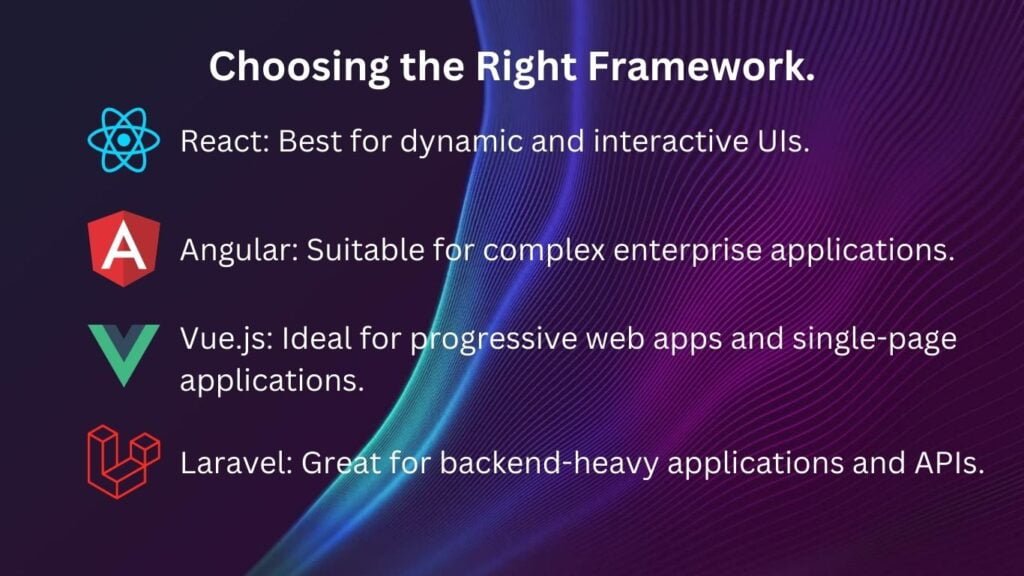Select the Right Web Development Framework for Your Project in 2024

Introduction
Choosing the right web development framework is critical for your project’s success. The right framework can streamline development, enhance performance, and ensure scalability.
Popular Web Development Frameworks
Understanding the strengths and weaknesses of popular frameworks is essential for making the right choice. Here’s a closer look at some of the most widely-used frameworks:
React: Developed and maintained by Facebook, React is a JavaScript library widely used for building dynamic user interfaces, particularly for single-page applications (SPAs). React’s component-based architecture allows developers to create reusable UI components, making it ideal for projects that require frequent updates and interactive features.
Angular: A robust framework maintained by Google, Angular is a comprehensive solution for building large-scale, enterprise-level applications. It offers a powerful set of tools for developing complex and data-driven applications, including two-way data binding, dependency injection, and a modular architecture that promotes code organization.
Vue.js: Vue.js is a progressive JavaScript framework that is both lightweight and versatile. It is particularly well-suited for small to medium-sized projects but can also scale to handle larger applications. Vue’s simplicity and ease of integration with existing projects make it a favorite among developers looking for flexibility.
Laravel: For backend development, Laravel is a PHP framework renowned for its elegant syntax and robust features. It excels in building complex backend systems, APIs, and web applications with a focus on security and performance. Laravel’s extensive documentation and built-in features, like Eloquent ORM and Blade templating engine, make it a popular choice among PHP developers.
Key Factors to Consider When Choosing a Framework
Selecting the right framework goes beyond just knowing the popular options. You must carefully evaluate your project’s specific needs and consider the following factors:
Project Requirements: The nature of your project should be the primary driver in your decision. For instance, if you’re developing a highly interactive user interface, React might be the best fit. For large-scale enterprise solutions, Angular’s comprehensive tools and structure are advantageous. Understand the unique requirements of your project before making a choice.
Scalability: As your project grows, so too should the capabilities of your chosen framework. Consider whether the framework can handle an increase in users, data, and functionality. Angular, for example, is designed with scalability in mind, making it suitable for projects that may expand significantly over time.
Community Support: A framework with a large and active community offers better resources, plugins, and third-party tools. React and Angular boast extensive communities, providing ample support, tutorials, and libraries that can significantly speed up development and troubleshooting processes.
Ease of Use: Consider the learning curve associated with the framework. A framework that aligns with your team’s expertise can lead to more efficient development. Vue.js, with its gentle learning curve and clear documentation, is often recommended for teams that value simplicity and quick onboarding.
Performance: Evaluate how the framework handles performance, particularly in terms of load times and responsiveness. React, with its virtual DOM, is optimized for high performance, making it ideal for applications where speed is critical.
Use Cases for Popular Frameworks
To better understand which framework suits your project, consider the following use cases:
React: Ideal for creating dynamic, interactive user interfaces, such as dashboards, social media apps, and SPAs. Learn more about React.
Angular: Best for enterprise-level applications that require robust, well-organized codebases, such as CRM systems, large e-commerce platforms, and complex business applications. Learn more about Angular.
Vue.js: Suitable for developing progressive web apps (PWAs) and SPAs, as well as projects where flexibility and ease of integration are key. Learn more about Vue.js.
Laravel: Excellent for backend-heavy applications, APIs, and projects requiring complex database interactions, such as content management systems (CMS), online booking platforms, and e-commerce sites. Learn more about Laravel.
Conclusion
Choosing the right web development framework is a decision that requires careful consideration of your project’s specific needs, your team’s expertise, and the framework’s scalability and support ecosystem. By evaluating these factors and understanding the strengths of popular frameworks like React, Angular, Vue.js, and Laravel, you can make an informed choice that will set your project up for success. Whether you’re building a small startup website or a large enterprise application, the right framework can be the key to achieving your project’s goals and ensuring long-term success in the ever-evolving world of web development.


